|
|
|
Sort Order |
|
|
|
Items / Page
|
|
|
|
|
|
|
| Srl | Item |
| 1 |
ID:
132085
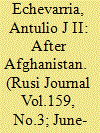

|
|
|
|
|
| Publication |
2014.
|
| Summary/Abstract |
One of the key issues to be discussed at the forthcoming NATO summit will be preparation for future military engagements after more than a decade of counter-insurgency operations in Afghanistan. Antulio J Echevarria II revisits some of the key lessons to be drawn from this experience, and highlights the questions that will need to be addressed if the Alliance is to be equipped to meet future challenges in a changing world.
|
|
|
|
|
|
|
|
|
|
|
|
|
|
|
|
| 2 |
ID:
132083
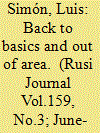

|
|
|
|
|
| Publication |
2014.
|
| Summary/Abstract |
As Allied combat forces return from Afghanistan, Russia's annexation of Crimea has reminded NATO that the security of a rules-based international system in Europe cannot be taken for granted. Efforts to reassure Allies and partners in Eastern Europe have thus become a top priority. This, however, should not lead the Allies to turn their backs on broader, global geostrategic developments - particularly at a time when Asia is emerging as the world's economic and geopolitical centre of gravity. If the West is to prosper in a changing world, argues Luis Simón, it should be able to both defend Europe and project security globally.
|
|
|
|
|
|
|
|
|
|
|
|
|
|
|
|
| 3 |
ID:
151198
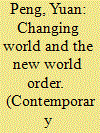

|
|
|
|
|
| Summary/Abstract |
Believe it or not, the world has changed not due to worldwide wars but in a reformative, progressive, inconspicuous way. Though there is no clear-cut division between quantitative change and the qualitative one, after the alternations of the Westphalian System, the Versailles-Washington System and the Yalta System, world order is being restructured for a fourth time, a historical moment unprecedented in the last 400 years. Dramatic, at times devastating, changes of order were once linked to globe-wide wars (hot or cold), but the current change in world order stems from regional conflicts such as those in Afghanistan, Iraq and elsewhere, nuclear crises in the DPRK and Iran, the Ukraine crisis, and friction over East China and South China seas. Rising new economies, sluggish Western economies with changing demographics, emerging non-state actors, and interlocking problems contest theWest’s leadership of the international system.
|
|
|
|
|
|
|
|
|
|
|
|
|
|
|
|
| 4 |
ID:
096074


|
|
|
| 5 |
ID:
166035
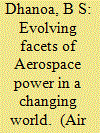

|
|
|
| 6 |
ID:
130578


|
|
|
|
|
| Publication |
2014.
|
| Summary/Abstract |
In the context of mineral extraction in South East Asia, the rural poor are generally portrayed as victims of large, invading corporatized mining enterprises. However, this paper argues that local villagers have also shown considerable agency in taking advantage of the mineral resource boom by diversifying their livelihoods to include informal mining. In South East Asia, the growth of informal mining has occurred within the overall process of agrarian transition. This paper focuses on a mineral-rich valley in southern Laos to highlight the location-specific nature of such transitions. The valley's environmental transformation has both caused and accompanied a modification in the peasant ways of life, and the recent entry of transnational mining companies and the growing market price of tin have fundamentally altered the relationships of the peasants with place, while at the same time encouraging them to claim mineral resource rights in ways that are not accommodated in conventional mining legislation. To conclude, the paper notes the multiple interpretations and contradictions of the increasing mineral dependence among Lao peasants in a rapidly changing world.
|
|
|
|
|
|
|
|
|
|
|
|
|
|
|
|
| 7 |
ID:
172401
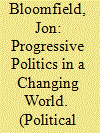

|
|
|
|
|
| Summary/Abstract |
In Britain and across Europe, the social alliances that sustained progressive politics for a century are disintegrating. The financial crisis of 2007–8 showed that Labour and its ‘third way’ European followers had got the economics of modern capitalism wrong. With the mainstream left compromised, it has been the nationalist right that has benefitted, re‐defining politics around issues of nation, culture and identity. What is surprising is the number of influential voices across the centre and left of politics who have accepted much of this far‐right analysis and adopted its language and terminology. These trends, especially post‐Brexit, have crystallised in the UK around the label of ‘Blue Labour’. This article examines the fallacies and flaws of the Blue Labour tendency in four key areas—class, economy, family and race—and suggests alternative ways forward, which seek to forge rather than disrupt alliances between the working class and new social movements.
|
|
|
|
|
|
|
|
|
|
|
|
|
|
|
|
| 8 |
ID:
172403
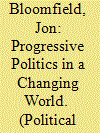

|
|
|
|
|
| Summary/Abstract |
if you are contesting a political argument, there are three broad routes you can follow. Either you engage with the case your opponent has outlined; or you can caricature the arguments; or you can attack the author. Sadly, Matthew Goodwin and Eric Kaufmann have combined the latter two options in their riposte to my piece on the fallacies of Blue Labour.
|
|
|
|
|
|
|
|
|
|
|
|
|
|
|
|
| 9 |
ID:
087543
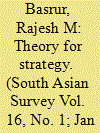

|
|
|
|
|
| Publication |
2009.
|
| Summary/Abstract |
The realist school of thought in international relations theory, under attack in the post-Cold War era for its numerous failings, has turned away from its focus on system structure to a refined version of its earlier form, which also focused on domestic factors and policy choice. But the neoclassical school neglects important systemic dynamics arising from variations in levels of economic and strategic interdependence. A refined neoclassical approach, by focusing on the relationship between degrees of interdependence and the role of structure, identifies the scope for optimal policy choice in different settings. For India, a nation on the threshold of major power status, this provides an improved basis for interpreting the changing international system and fashioning an appropriate broad strategy toward it.
|
|
|
|
|
|
|
|
|
|
|
|
|
|
|
|
| 10 |
ID:
139817
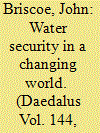

|
|
|
|
|
| Summary/Abstract |
This essay defines the concept of water security and explores the implications of the eternal pursuit of it. I will describe how water security is perceived by wealthy and by poorer nations, the tensions that arise from these differing views, and how these tensions are being resolved in a world in which the geography of economics and power is changing rapidly. I outline a few iconic cases of how societies have built institutions and infrastructure to deal with both floods and droughts. The essay assesses the effects of changes in climate and land use systems, and the differing reactions to the new perception of “nonstationarity”: the idea that these systems are less predictable than they have historically been. The essay concludes with some reflections on the challenges of educating young people seized with passion for the issues of their generation but who may have difficulty taking a long view of water security. Many have been taught about the environmental ravages wrought by water infrastructure, but few understand how these same infrastructure and institutions underpin the water security that the United States has achieved.1 Similarly, we teach the next generation too little about the remarkable contributions of “thinking practitioners”: experts who are also involved in policy-making and planning–whose work underpins the food, water, and energy security of their societies.
|
|
|
|
|
|
|
|
|
|
|
|
|
|
|
|
|
|
|
|
|